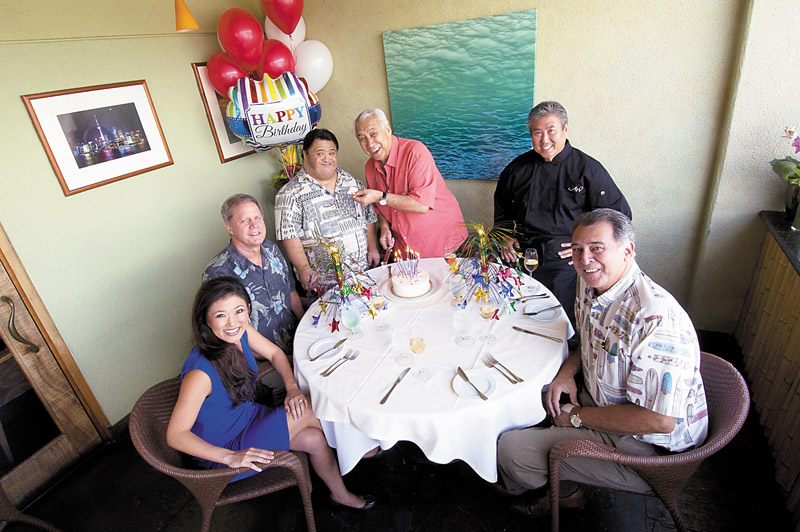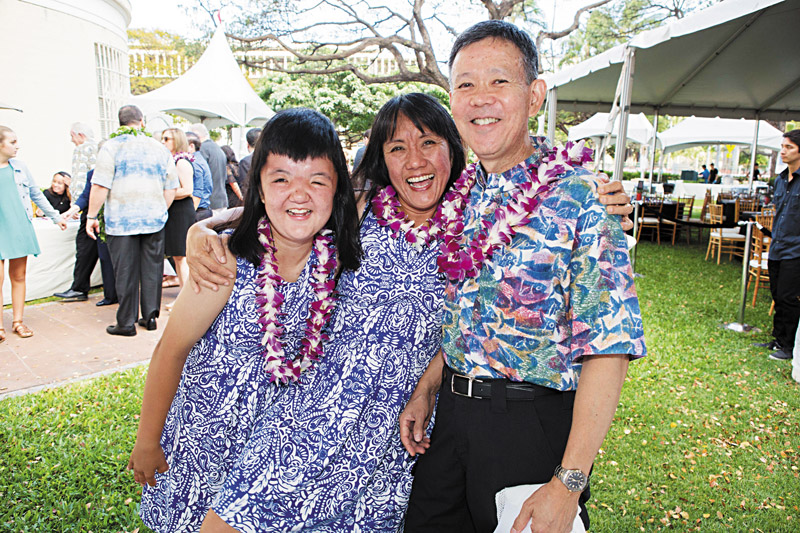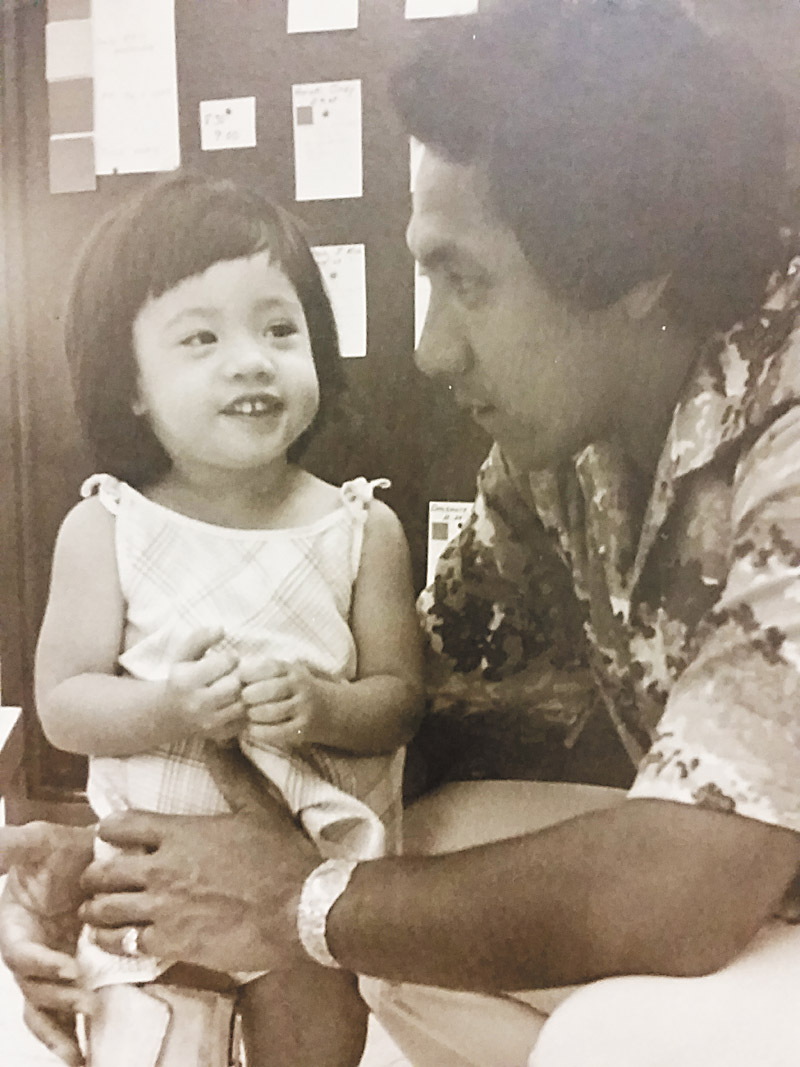Easter Seals: Special In Every Way

(From left) Easter Seals Hawaii director of development Kelly Ikeda Ellis, Easter Seals Hawaii president and CEO Ron Brandvold, Shawn Galuteria, Danny Kaleikini, chef Alan Wong and state Sen. Brickwood Galuteria NATHALIE WALKER PHOTO
Say Happy 70th Birthday to the agency that is there when a child with special needs is born to guide them toward a productive life
Our histories are strewn with our prejudices against and insecurities about those unlike ourselves. Whether we enslaved their bodies or tormented their souls, our collective fear of those who look or act different than our perceived “normal” seems bound to result in mistreatment.
Perhaps the worst of these transgressions were perpetrated on those least equipped to defend themselves against the ill will of society: the crippled. Whether their needs were of a physical or mental variety, we would “provide” them with forced lobotomies, sedation and institutionalization. After all, it was the kindest thing we could do, for they had nothing to contribute to society, right?
“In the old days, there were institutions and you put people in them, and you drugged them, and one staff could accommodate 10 people, and they were out of sight, out of mind,” says Ron Brandvold, president and CEO of Easter Seals Hawaii. “That is not the way of the world anymore.”
Fortunately, we have evolved as a people, and for the special-needs community of Hawaii it is thanks in no small part to the concerns of Territorial Gov. Ingram Stainback and the actions of Olga and Edward Sultan, who formed Sultan Foundation Nursery School.
It was just after the end of World War II, and in the light of a brighter future, Stainback often would lament about the plight of the crippled children of Hawaii, how there just wasn’t enough money to take care of them in public schools. The Sultans, upon hearing of these needs, got together with fellow business leaders to form a school to equip special-needs kids with the skills and tools they would need to join society in public schools.
The school partnered with a like-minded national organization and became Easter Seals Hawaii, which celebrated its 70th anniversary this year in April with a gala dinner featuring local chefs including Alan Wong, and the release of a television special by award-winning local film-maker Edgy Lee.
“This TV special is an intimate look into the lives of families, not unlike your own, who face the daily challenge of living with loved ones with special needs,” says Lee, whose special will re-air on KFVE at 7 p.m. June 24.
“Their stories are poignant and inspiring. I’m always proud to learn that Hawaii was a source for innovation. Honolulu set the standard for early childhood intervention back when the Sultan family, Duke Kahanamoku, Hilo Hattie, Gov. John Burns, Judge Chuck Mau and myriad dedicated staff and volunteers created the first Sultan School, which became Easter Seals Hawaii and a model for other U.S. cities.”
“Mister Aloha” Danny Kaleikini, who has been a champion of ESH for nearly half a century, narrates the special.
“I served as Easter Seals chairman in 1972, so I’ve been a friend to this organization for nearly 50 years, for good reason,” says Kaleikini. “Easter Seals Hawaii continues to be an essential source for people in need. They’re about people, and the true spirit of aloha. They embody a kama‘aina spirit that is about providing services to as many families as they can, and they need our support.”
One of those families in need belongs to state Sen. Brickwood Galuteria, who found the aid they received from ESH to be invaluable.
“For our ohana, Easter Seals provided a solid foundation,” says Galuteria. “When we found that Shawn would require special needs and a special understanding, we soon realized that we, as parents and family, would need the same.
“Easter Seals was our first touch and a lifeboat in very tumultuous seas. We became very appreciative of their presence and it was clear that we had been the recipients of a special life experience. Over time, as much as he lived with us, we lived with Shawn. Easter Seals helped us. You’re never alone at Easter Seals. It’s all about community.”
ESH provides service for life, beginning with its Early Intervention Program that is free to those who need it from birth until their third birthday. This government-funded program helps get the developmentally challenged off to a good start with speech, physical and occupational therapy. Last year, it helped 1,100 kids across the state in its 14 locations.
What used to be a drop-off service has morphed in recent years, following the “teach a man to fish” philosophy.
“Our people go to the homes, and in that natural environment help that child function in that environment and have the parents watch what we do and participate, so they learn how to help their child, so when our therapist leaves, they are better than when our therapist arrived,” says Brandvold.
“Then the kid can progress more quickly than if it was just drop-off and pickup. We are family centered; we very much believe that when we help the individual, we are helping the family.”
It continues to work with participants in the program throughout their lives, using its staff of 460 to customize the assistance to the individual.
“Now we identify the special needs of the individual and set goals and measure against those goals, and if you perform, then you can justify the request to continue those services,” says Brandvold.
For some, however, the program is just a stepping stone, and getting the ESH participants integrated into society is the goal whenever it is possible. Its vocational training centers focus on their abilities rather than disabilities, teaching them skills that will be valued by future employers.
“Before, people just went through services. Now the intent is to get them jobs,” says Brandvold, citing employment in grocery stores and warehouses, where special needs people are more than capable of filling positions.
“Some people have a disability, but they are still capable of doing things. They have to be empowered. People who have traditionally not gotten jobs, it’s partly because they never perceived they could get jobs, and partly the community didn’t perceive they could. Now they go through a procedure called ‘discovery’ to find out what the individual is capable of and what they are interested in doing, and help them find what they like. And once they get jobs, they don’t have to come to our center anymore, they don’t require the service they did, and now they are earning income, paying taxes and they are proud. They have dignity.”
A shining example of this can be seen in young Maile Ogata, who now attends Moanalua High School as a freshman. She was born with a rare condition called Apert syndrome. It is characterized by a malformation of the skull, face, hands and feet. She has had to endure 22 surgeries in her young life, and it was the people at ESH who early on helped her to learn the most basic of skills, like how to bend her fingers and how to crawl.
Friends of the family conducted a fundraiser for her in 2005 to help with some of the medical bills that Maile’s condition generated. It was a great success, and when they tried the following year, the Ogatas agreed to do it, but not for themselves. They wanted to use it as a way to raise awareness, and instead of keeping the money for their needs, donate it to ESH.
Called “Maile’s Dream,” the fundraiser is a fair that features activities like blind bowling and wheelchair basketball to open young people’s eyes to the plight of others and to celebrate our differences. Over the past decade, it has raised more than $40,000 for ESH and has spread the message that Maile’s mother Cindy borrowed from Dr. Martin Luther King Jr.
“I have a dream … that one day my child will not be judged by her physical difference but by the content of her character.”
For Maile, the future is limitless, despite what would have been a debilitating condition just a generation ago. Her generosity in giving back to those who helped her inspires the entire organization.
“To have a family like the Ogatas who express their appreciation and support of Easter Seals Hawaii for more than a decade after receiving services validates the quality of our programs, and the dedication of our staff to provide life-changing services to children, youths and adults with disabilities or special needs, so they may lead independent, fulfilling lives,” says Kelly Ellis, director of development at ESH.
If you have a friend or family member in need of ESH services or would like to make a donation to its cause, go to easterseals.com.








